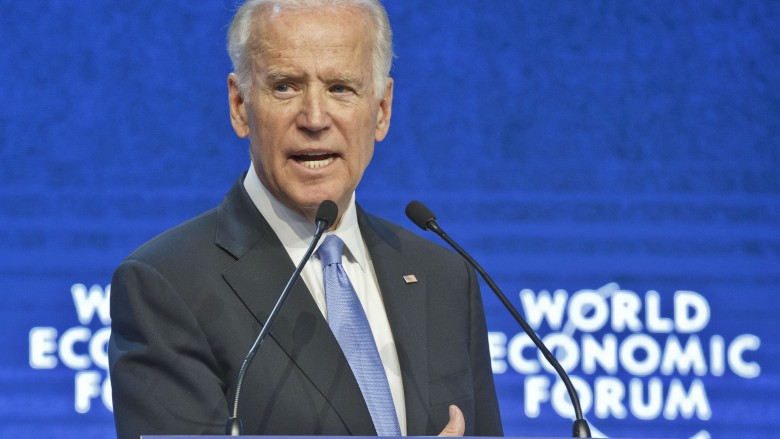Biden name bubbles up amid speculation over Clinton, Sanders
By Evan Lips | January 20, 2016, 21:18 EST
 US Vice President Joe Biden speaks at the World Economic Forum in Davos, Switzerland, Wednesday. (AP Photo/Michel Euler)
US Vice President Joe Biden speaks at the World Economic Forum in Davos, Switzerland, Wednesday. (AP Photo/Michel Euler) WASHINGTON – Plummeting poll numbers and a frosty reception from women are triggering alarms inside Hillary Clinton’s Democratic presidential campaign and prompting pundits and even a GOP contender to resume tossing around the idea of a Joe Biden candidacy.
“Voices are being heard among the political classes about the possibility of replacing Clinton on the Democratic ticket with Vice President Joe Biden should that become necessary,” conservative columnist Cal Thomas recently wrote. “Such a move could severely impair the Democrat’s ability to win the female vote.”
Or could it?
A recent USA Today/Rock the Vote national poll shows that Bernie Sanders, the 74-year-old Senator from Vermont, is maintaining a 19-point lead over Clinton among younger women. The survey showed that 50 percent of Democratic and independent women between 18 and 34 favor Sanders, a self-described democratic socialist. Just 31 percent backed Clinton, who is 68.
A Monmouth University poll released Tuesday shows that female support for Clinton has eroded, While she still leads, what was a 45-point gap between the two hopefuls among women in December has plummeted to just 19 points.
Clinton has reacted by adding millennial women’s icon Lena Dunham and Abby Wambach, the openly lesbian U.S. women’s soccer star, to her entourage for recent New Hampshire campaign stops. She also landed an historic endorsement from abortion-provider Planned Parenthood. Yet a poll from cable television’s CNN and New Hampshire’s WMUR-TV published Tuesday shows Clinton getting buried under Sanders’ surge by a 27-point margin.
Biden appears to be keeping an eye on campaign trends and perhaps news regarding Clinton’s travails as well.
Asked two weeks ago if he had any regrets over deciding not to run, Biden told NBC Connecticut’s Keisha Grant: “I regret it every day.”
Wednesday, Biden, 73, attacked socialism in a speech at the World Economic Forum in Davos, Switzerland, saying the U.S. doesn’t need it or a tax code that punishes millionaires and billionaires. Sanders has proposed tax increases to raise more than $1 trillion a year in new federal revenue, including by boosting the top marginal income-tax rate to 52 percent from 39.6 percent, increasing everyone’s rate by 2.2 percent and lifting the estate tax to 65 percent from 40 percent.
“We need – not just in my country, but in other countries – a more progressive tax code. Not confiscatory policy, not socialism, a tax code,” Biden said at Davos, according to CNN. “Everybody pays proportionally a fair share. This is not meant to penalize everybody.”
The vice president later repeated this sentiment on Twitter:
“We need a more progressive tax code — not confiscatory policy. Not socialism. A tax code.” -VP Biden #wef16
— Vice President Biden (@VP) Jan. 20, 2016
While never mentioning Sanders, Biden’s comments further distanced him ideologically from the Democratic hopeful who is also running neck-and-neck with Clinton in Iowa, site of the first nominating contest with its Feb. 1 party caucuses. Sanders hasn’t been shy about proclaiming his socialist views:
Democratic Socialism means means creating a government that represents all of us, not just the wealthiest. https://t.co/4jYF0nbPKT
— Bernie Sanders (@BernieSanders) Nov. 18, 2015
The vice president’s Davos speech also touched on themes such as economic fairness, corporate ethics and helping middle-income families, CNN said. Biden’s staff told the network that the jab at socialism wasn’t meant to target Sanders.
Clinton’s possible legal entanglements over her email use haven’t faded away, either.
In recent days, news reports have surfaced about the breadth and depth of the FBI’s investigation of the former secretary of state’s use of a private email server in her home while exchanging classified messages as the nation’s top diplomat. Fox News reported Tuesday that some emails classified as more sensitive than Top Secret had been found on the server, citing Charles I. McCullough, the inspector general for the U.S. intelligence community. Speculation has risen over whether Clinton may be indicted.
New York billionaire Donald Trump, the Republican presidential contender who leads in most voter surveys in New Hampshire, site of the first primary election Feb. 9, recently floated Biden’s name during a radio interview after being asked who would have the best chance to win should Clinton face an indictment.
NOW @whoradio – @realDonaldTrump says @VP will come in on a white horse be the #Dem nominee if @HillaryClinton is indicted #IowaCaucus #tcot
— Simon Conway (@SimonRadio1776) Jan. 19, 2016
A late entry into a presidential primary race would not be unprecedented.
Hubert H. Humphrey, then a sitting vice president like Biden, entered the Democratic race in late April 1968, after President Lyndon Johnson unexpectedly withdrew. But Humphrey focused on winning over unelected convention delegates rather than the primaries. Amid the tumult of the wild 1968 Democratic National Convention in Chicago, bracketed by rioting in the streets outside, Humphrey won the nomination. He went on to lose to Republican Richard M. Nixon.
In 1972, the original odds-on favorite to land the Democratic nomination, Ed Muskie, a senator from Maine, saw his campaign collapse after he won in neighboring New Hampshire by a smaller margin than expected.
George McGovern’s near-upset of Muskie in the Granite State prompted Humphrey, then a senator from Minnesota, to jump into the race. Humphrey’s late entry proved unsuccessful as McGovern, a senator from South Dakota, wound up securing the nomination. The outspoken opponent of the Vietnam War famously lost in every state but Massachusetts as then-President Nixon won in a landslide.
In the 2016 campaign, filing deadlines to get on state primary ballots have already expired in 23 states, including Iowa and New Hampshire, but the possibility still exists that Biden could wait all the way up until the party’s Philadelphia convention in late July.
According to a Rasmussen Reports analysis, additional candidates can emerge should the convention face a deadlock:
“The convention could hypothetically turn to a candidate who didn’t win the largest number of delegates – or who didn’t win delegates at all. But let’s not assume wild hypotheticals: Not since 1968 has either party picked a nominee who didn’t participate in the primaries.”











